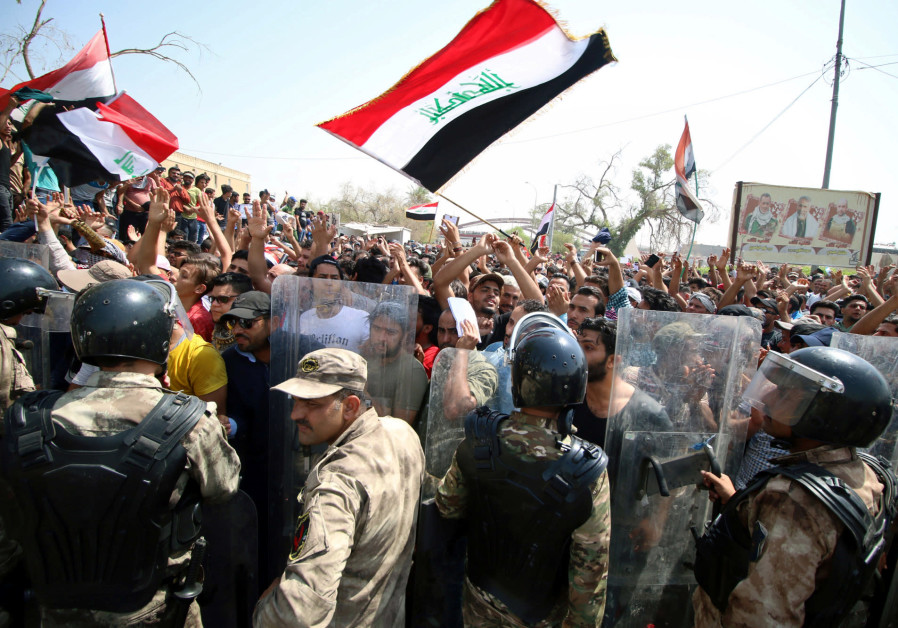How the U.S. could lose Iraq to creeping Iranian influence

Protesters gather near the main provincial government building in Basra, Iraq July 15, 2018.. (photo credit: ESSAM AL-SUDANI/ REUTERS)
US Congressman Ted Poe has been pushing to sanction Iranian-backed militias in Iraq. In mid-August he spoke about the need to “stand up to Iran’s proxies” in Iraq. “The country is attempting to rebuild,” he said. But the Shia militias were not disbanding and their presence was undermining the government’s authority.
Now the US risks losing in Iraq again as enemies of Washington seek to form a government coalition and Congress seeks to sanction militias that hold sway in Baghdad.
Poe is just one of many voices in Washington who have been warning about Iran’s creeping influence over Iraq.
Earlier this week, the White House warned that Tehran would be held accountable for the actions of the proxies it backs in Iraq. But the US administration is less willing to say which proxies it means.
Poe has singled out Asa’ib Ahl al-Haq and Harakat Hezbollah al-Nujaba. When Congress was debating the National Defense Authorization Act (NDAA) there was a provision to impose sanctions on them in the version of the bill presented in the House. But in the final version they weren’t specifically mentioned.
This is because Congress – and by extension the administration – is reticent to name groups because it would then mean confronting the degree of Iranian involvement in Iraq and mapping out the proxies that are not merely tied to Iran but are also part of the Iraqi government.
Militias like Al-Nujaba, Asa’ib Ahl al-Haq, Kata’ib Hezbollah and Badr grew in strength during the war against the Islamic State. Many of their leaders are not only tied to Iran and the Islamic Revolutionary Guard Corps (IRGC) but they are led by those the US has sanctioned for terrorist acts in the past.
JPOST VIDEOS THAT MIGHT INTEREST YOU:
Qaiz Khazali of Asa’ib Ahl al-Haq was once detained by the US and Abu Mahdi al-Muhandis of Kata’ib Hezbollah has been sanctioned in the past. But their militias were part of the Iraq’s Popular Mobilization Units during the war on ISIS and they were incorporated into the official Iraqi paramilitary forces between 2016 and 2018.
Some of them even managed to “borrow” tanks the US had supplied to Iraq. In November, al-Nujaba was asked about its heavy weapons. “We are not rebels or agents of chaos and we do not want to be a state within a state,” Al-Nujaba’s Hashim al-Mouasawi told reporters. It didn’t have to be a “state within a state” because it was increasingly part of the state.
When former US Secretary of State Rex Tillerson told Iraq that the militias should go home, Prime Minister Haider al-Abadi responded that they were the “hope” of Iraq.
A year later Abadi is in the middle of a tug-of-war between Washington and Tehran.Washington wants to see an amenable administration emerge in Baghdad and Iran’s influence diminished.
This is part of the Trump administration’s overall policy spelled out by the Iran Action Group formed in August. But the US doesn’t know how to wean Baghdad off the militias. Abadi has sought to reduce the power of the PMU after Hadi al-Amiri of the Fatah Alliance came in second place in elections.
Abadi’s “victory” coalition came in third. In a sense, Abadi sees himself as the person who helped lead Iraq to victory over ISIS and now the PMU leader Amiri is taking the spoils.
Abadi is also a pragmatic politician who seeks to work with Iran, Turkey, the US and Saudi Arabia.
Poe argued in August that the Iranian-backed militias “must be targeted so that those freedom- loving Iraqis who hope to rebuild their country can see that America stands with them.”
But Congress admitted in July it doesn’t even know the full extent of IRGC penetration of Iraq. In the NDAA, Congress asked the government to report on “the extent to which any forces associated with Iran’s IRGC have been incorporated into the Iraqi Security Forces.”
Another section sought to limit assistance to the government of Iraq so that funds provided to Iraq would not end up with the “IRGC-Quds Force or a state sponsor of terrorism.”
This shows the extent to which Washington has ignored the need to confront the IRGC in Baghdad. The question is whether it is too late. The Kurdish parties in Iraq, once the closest allies of the US, were dismayed last year when Washington harshly opposed their independence referendum.
Little was done to help the Kurds as Baghdad closed the airports in their region and sought to isolate them. Sunnis in Iraq also remember when the Obama administration sided with Nouri al-Maliki, a rightwing Shia leader who came in second in the 2010 elections, instead of backing Ayad Allawi, the secular centrist candidate.
Later it was revealed that Washington thought a strongman, even one allied with Tehran, would be better for Iraq.
Instead Maliki alienated Sunnis and helped cause the chaos that led to ISIS.
Today, Washington faces another challenge in Baghdad and in the Kurdish regional capital of Erbil. If it can’t help salvage a working relationship and find allies, it will have given Iran a major win.
Join Jerusalem Post Premium Plus now for just $5 and upgrade your experience with an ads-free website and exclusive content. Click here>>






Comments are closed.